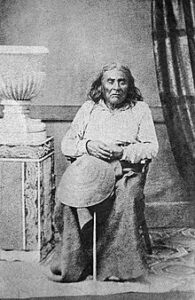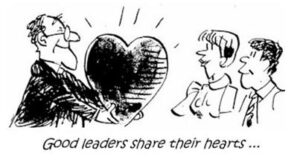Guest post by Graham Williams.
Would you like to lead yourself, others, and organizations to practice virtuous, positive leadership? Let me share some stories to inspire you. Huge wisdom may be contained in a small story. There’s a reason Jesus taught the people by using parables. The parable of the good Samaritan carries lessons for today’s leaders, professionals and organizations.
A man was going down from Jerusalem to Jericho when he fell into the hands of robbers. They stripped him of his clothes, beat him and went away, leaving him half dead.
A priest happened to be going down the same road, and when he saw the man, he passed by on the other side.
So too a Levite, when he came to the place and saw him, passed by on the other side.
But a Samaritan, as he traveled, came where the man was; and when he saw him, he took pity on him. He went to him and bandaged his wounds, pouring on oil and wine.
Then he put the man on his own donkey, took him to an inn and took care of him. The next day he took out two silver coins and gave them to the inn-keeper. “Look after him,” he said, “and when I return, I will reimburse you for any extra expense you may have”. (Luke 10:30–35).
We’re on the same road
We find ourselves on the same road as many others. Everything (and everyone) is intimately and immediately connected to everything else. Priest, Levite, Samaritan, inn-keeper, robbers, a man who is robbed – all their paths intersect on the same road. Chief Seattle of the Duwamish Tribe made a remarkable statement in 1854:
“Humankind has not woven the web of life. We are but one thread within it. Whatever we do to the web, we do to ourselves. All things are bound together. All things connect”.

The speech from which this quote is taken speaks eloquently to our need to care for the environment, society and the future of humanity. The sentiment resonates with findings in Gestalt psychology, Integral Theory, the Collective Unconscious, Systemic Thinking, Chaos Theory, Quantum Physics and Neuroscience. It also resonates with aspects of Hindu, Buddhist, Shamanic and the Christian mystical tradition. Physicist Fritjof Capra of The Tao of Physics defines spiritual awareness as an “understanding of being embedded in a larger whole, a cosmic whole, of belonging to the universe”.
Walter Baets of the University of Cape Town offers this wisdom to business leaders: “Since your company is a network, and the market is a network, it is crucial to understand the mechanics of the network. A network cannot be deconstructed into basic elements so that, if they could be optimized individually, the entire network would be optimized. A network can only be “optimized” or managed if we accept it as a complete network, a holistic structure.”
Who we are as business executives and what we do affects the web of business life, where we are influencers shaping the web and the strength of the threads. We have a choice. To be lightly held as we traverse the web or to distort it by behaviors that split, tear and that sever connections.
Bad things happen on this road
 Every day we hear about corruption, fraud, tender collusion, bribery, tax evasion, excessive executive pay, failures and disasters from the worlds of oil, banking, construction, mining, arms trading. There is a vicious circle of increasing consumption and diminishing resources, waste, degradation and pollution, poverty, unemployment, disease, escalating conflict. More species are becoming extinct, levels of education are poor – even declining in some countries. Space debris is a looming problem. A third of all food produced in the world goes to waste. At the same time “under-nutrition was the main underlying cause of death in children under five, causing 45% of all child deaths in the world in 2013”. (According to the Second International Conference on Nutrition in Rome, 19-21 November 2014).
Every day we hear about corruption, fraud, tender collusion, bribery, tax evasion, excessive executive pay, failures and disasters from the worlds of oil, banking, construction, mining, arms trading. There is a vicious circle of increasing consumption and diminishing resources, waste, degradation and pollution, poverty, unemployment, disease, escalating conflict. More species are becoming extinct, levels of education are poor – even declining in some countries. Space debris is a looming problem. A third of all food produced in the world goes to waste. At the same time “under-nutrition was the main underlying cause of death in children under five, causing 45% of all child deaths in the world in 2013”. (According to the Second International Conference on Nutrition in Rome, 19-21 November 2014).
The gap between the rich and poor is still widening: 85 individuals have the same wealth as half the people on our planet. (Oxfam ‘Even it Up’ report, 2014).
Who is robbing whom?
The Jericho road was the notorious ‘Way of Blood’. Is the road we travel as businesses all that different? Sometimes we are the ones who carry out the harm. Few identify with the robbers when reading the parable. But every time business uses a ‘tax haven’, pollutes the environment, or cuts corners because of profit pressures, someone somewhere is robbed in some way, either directly or indirectly.
Pope Francis gave this message to the World Economic Forum in Davos in January 2014: “What is needed, then, is a renewed, profound and broadened sense of responsibility on the part of all. Business is, in fact, a vocation, and a noble vocation, provided that those engaged in it see themselves challenged by a greater meaning in life” (Evangelii Gaudium, 203). I ask you to ensure that humanity is served by wealth and not ruled by it.”
The Pope is on record as saying: “An economic system centered on the god of money needs to plunder nature to sustain the frenetic rhythm of consumption that is inherent to it.”
Who are we really?
Sometimes what we present to the outside world is not who we really are. The Priest and Levite probably acted reasonably given their context and situation. Business circumstances often lead to a disconnect from espoused values.
If a priest, psychologist, coach, investigative reporter, or lawyer tells me that one of their values is confidentiality my reaction is ‘So what?’ and ‘How boring!’. But how about a business company that states their core value are integrity, accountability, and responsibility?
All too frequently there are disconnects between what organizations state their operating values to be and what happens in practice. When things go wrong, there is avoidance, denial, a cover-up: a crossing to the other side of the road.
There has been some movement towards adopting a triple-bottom-line approach: people, planet and profits in balance. We’re also seeing more compliance measures and controls. India now has a law mandating businesses to allocate 2% of proceeds to corporate social responsibility. These minimum standards typically lead to a ‘speed limit effect’. In other words, business complies by doing only what is mandatory, no more. By and large mindless chasing after maximizing profits (a concept introduced in the 1970s) is still a clear driver of many businesses today – and, of course, this works against sustainability on many levels.
Life is becoming more difficult for businesses – state creep, red tape, compliance pressures, economic woes – all increase the potential for behaviors to disconnect from stated values.
Who do we want to be?
We should do what’s right, what’s important to us, based on character virtues. The Samaritan did more than was expected. How’s that for you? And your workplace? Do you do more than expected? Do you do what’s right?
Acuiser in Peru does more than expected. They have a Bio Pencil project to mass produce pencils using a natural collagenous, seaweed-based compound that is farm grown. No chemicals are used in production. No natural resources are consumed or harmed. The pencil casing contains and protects seeds (vegetable, fruit, plants, shrubs, endangered flora species) and can be planted at the end of the pencil’s life. When these seeds are put into the ground, their casing acts as a fertilizer. (Read more: https://www.scribd.com/doc/57969378/BioPencil-An-Introduction#scribd )
Jaime Lerner, Mayor of Curitiba in Brazil since the 1970s, reinvented the city for people, planet, profit sustainability by building parks instead of canals to reduce flooding. Sheep are used to ‘mow’ the lawns, and the wool is used to fund children’s programs. He started revamping waste disposal and re-cycling. People living in slums received bus tokens, bags of groceries and transit passes in return for bags of trash. Off-season fishermen were paid for garbage collected. The Curitiba rate of garbage separation – at 70%, became the highest in the world.
These and other initiatives saved Curitiba millions. Their average income per person went from less than the Brazilian average in the 1970’s to 66% higher than the Brazilian average in a few decades.
 Nobel Peace Prize winner Muhammed Yunus (Grameen Bank) has made access to borrowing money easy for more than 100 million people who don’t have assets as security and were previously unable to break out of their cycle of poverty. He utilized peer support and teamwork as ‘guarantees’. Social business. He says that “a tiny little business can become a huge force to solve global problems”.
Nobel Peace Prize winner Muhammed Yunus (Grameen Bank) has made access to borrowing money easy for more than 100 million people who don’t have assets as security and were previously unable to break out of their cycle of poverty. He utilized peer support and teamwork as ‘guarantees’. Social business. He says that “a tiny little business can become a huge force to solve global problems”.
Virtuous organizations
There are a growing number of other inspiring examples of people and businesses changing vicious circles to virtuous circles.
“In virtuous organizations, employees collectively behave in ways that are consistent with the best of the human condition and the highest aspirations of humankind,” states Amanda Horne in “Virtuous Organisations”.
But take heed: “If a set of official values, as is so often found in business, is not anchored in the hearts and minds and behaviors of virtuous individuals, they will remain superficial, surface phenomena. Virtues, in contrast and by their very nature, are embedded in the people within whom they manifest”.
Our book The Virtuosa Organisation encourages being before doing and uses seven Leonardo da Vinci virtues to illustrate how to achieve this. It includes case studies on the ways to practically bring about what habit reversal and behavior modification is needed.
Purity of motive is key
 Richard Rohr (in “Daily Meditations”) says that “we mend and renew the world by strengthening inside ourselves what we seek outside ourselves, and not by demanding it of others or trying to force it on others”.
Richard Rohr (in “Daily Meditations”) says that “we mend and renew the world by strengthening inside ourselves what we seek outside ourselves, and not by demanding it of others or trying to force it on others”.
There is a danger that leaders may adopt ‘good’ behaviors for the wrong motive. There has been a recent scramble into ‘cause marketing’ where businesses showcase the good things they do, but which initiatives may not be genuine, authentic, and virtues-based. Their motive may be public relations, better market performance or higher profitability, for example:
Sustainability: “31 percent of companies say sustainability is boosting their profits and 70 percent report that sustainability has a permanent place on their management agenda”.
Doing good: The title of an article about Richard Branson’s book is a giveaway: Screw Business As Usual, And Make Your (Huge Piles Of) Money By Doing Good.
It comes down to this: In the short-term we can contribute to the common good even if our motive is not ‘pure’. But of course, this selfish mindset is not authentic, not congruent, not sustainable, and people will ultimately see through it. How is yours?
The miser visits a rabbi to complain how miserable he is. The rabbi takes him by the shoulders and places him in front of a mirror.
“What do you see?” he asks.
“I see myself,” mutters the miser.
The rabbi steers him to the window and asks, “What do you see now?”
The miser responds, “I see people and trees”.
“The difference,” says the rabbi, “is the silver on the mirror”.
Focusing on the ‘silver’ (and just seeing yourself) surely does not lead to contentment and wellbeing.
A Process
In our book The Virtuosa Organisation, we offer a practical blueprint for leaders and businesses wishing to transition to a virtuous organization.
With virtues at the heart of the business, workplaces transform. They can become free of fear and dysfunction, within departments and between silos. Desired behaviors are spontaneous, with no need for heavy compliance mechanisms. Business systems, processes, and technology, take account of the internal human factor as well as of wider society and the environment.
Leader and employee behavior is positively modified. Satisfaction, meaning and social connection (intrinsic motivation) thrive. Diversity of talent is fully harnessed. Upsizing takes place – allowing more to work (albeit shorter hours), and from home. Fears (of disapproval, vulnerability, isolation, criticism, career blocks and a host of others) and associated protective mechanisms were replaced by love… traditionally a taboo word in workplaces.

June Singer, a giant in the world of analytical psychology, says (in The Power of Love to transform our lives and our world): “In our concerns with counting and weighing and measuring, with precise descriptions and careful evaluation, we sometimes fail to recognize or give credit to values that do not fit these criteria. Or, when we do recognize that such values exist, we split them off from the consciousness of the marketplace and relegate them to the categories of religion or the arts”.
Authenticity and engagement become the keywords. Studies are beginning to appear reinforcing the need for love to be shown in workplaces.
A virtuous business drastically improves its ratio of job-creation/concrete assets to financial assets, adopts a sustainable ‘profit-feathering’ rather than ‘profit-maximization’ paradigm. Executive pay is more equitably aligned with worker pay and is measured on triple-bottom-line achievements.
My hope is that more organizations will change their strategic narrative and become forces for good in society, and in this way build their own sustainability. This requires them to look in the mirror and contemplate the parable of the virtuous business. Remember: we’re all traveling on the same planet…
- With which role do you identify from the parable of the Good Samaritan?
- How is the road you travel influencing your actions? Do you act upon your values?
- Do you do more than expected? Do you do what’s right according to your values?
- How can you lead yourself and others toward a virtuous circle?
- I dare you to answer in the comments section below…
Graham Williams is a certified management consultant, thought leader, business narrative practitioner and author based in Cape Town, South Africa. He can be reached at https://www.haloandnoose.com
His book “The Virtuosa Organisation: the importance of virtues for success in business”, was co-authored with Dorian Haarhoff and Peter Fox, and is published by Knowledge Resources.
Do you like this post? Please help me spread positivity by tweeting, sharing, and liking.
Sign up for blog updates.
